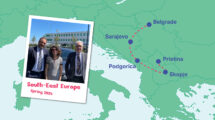The ”Up to University” (Up2U) Project https://up2university.eu/ – coordinated by GÉANT – is to bridge the gaps between secondary school and university by providing European schools with a Next Generation Digital Learning Environment (NGDLE) that helps students developing the knowledge, skills and attitudes they need to succeed at university. This student-centered digital learning environment forms the Up2U ecosystem, which integrates formal and informal learning scenarios and applies project-based and peer-to-peer learning methodology to develop transversal skills and digital competences crucial for success at university.
The target “Up2U skills” include socio-relational skills (collaborative problem-solving, team-working, appreciation of diversity, project management), cognitive skills (critical thinking, constructive commenting, languages), character-based soft skills (autonomy, resilience, motivation, self-esteem, flexibility) and knowledge skills (media and information literacy, selection and validation of digital content). There is no single system or tool that can develop all these crucial skills at once!
Up2U believes in a digital learning ecosystem that is a set of autonomous tools integrated together via open standards and protocols. Your good old Learning Management System (LMS) should no longer be the centre of your universe. Tools can be picked by the user in any shape and form to best support their individual learning path. The integrity of the ecosystem makes sure that both formal and informal learning scenarios contribute to the overall learning objectives of users (e.g. assessed by advanced learning analytics).
Why does an open NGDLE-based architecture support you better than any of the feature-rich single tools in the longer term?
- An ecosystem forces the user to stay functionality and methodology focused, instead of tool and technology driven. It supports critical and open thinking, creativity outside the box, rather than tunnelled vision and product lock-in to inflexible learning paths.
- Problem-based learning is better supported by an ecosystem while the traditional resource-based learning ties into a certain tool. The need for transversal (aka. transferable) skills is ever more increasing. Formal learning that schools offer is about the tools and resources, informal learning is about adoption capability. An ecosystem can potentially bridge the gap between these two scenarios.
- An open architecture brings scalability, flexibility, and portability. Individual elements can be modified, tailored to the actual learning needs, separated or even removed while the entire ecosystem stays intact. Collaborative and social skills are better supported by a learning ecosystem that mimics real-world scenarios.
If you wish to learn more about the Up2U ecosystem, its design and development, follow the Up2U project on Facebook, Twitter and LinkedIn.








Add Comment